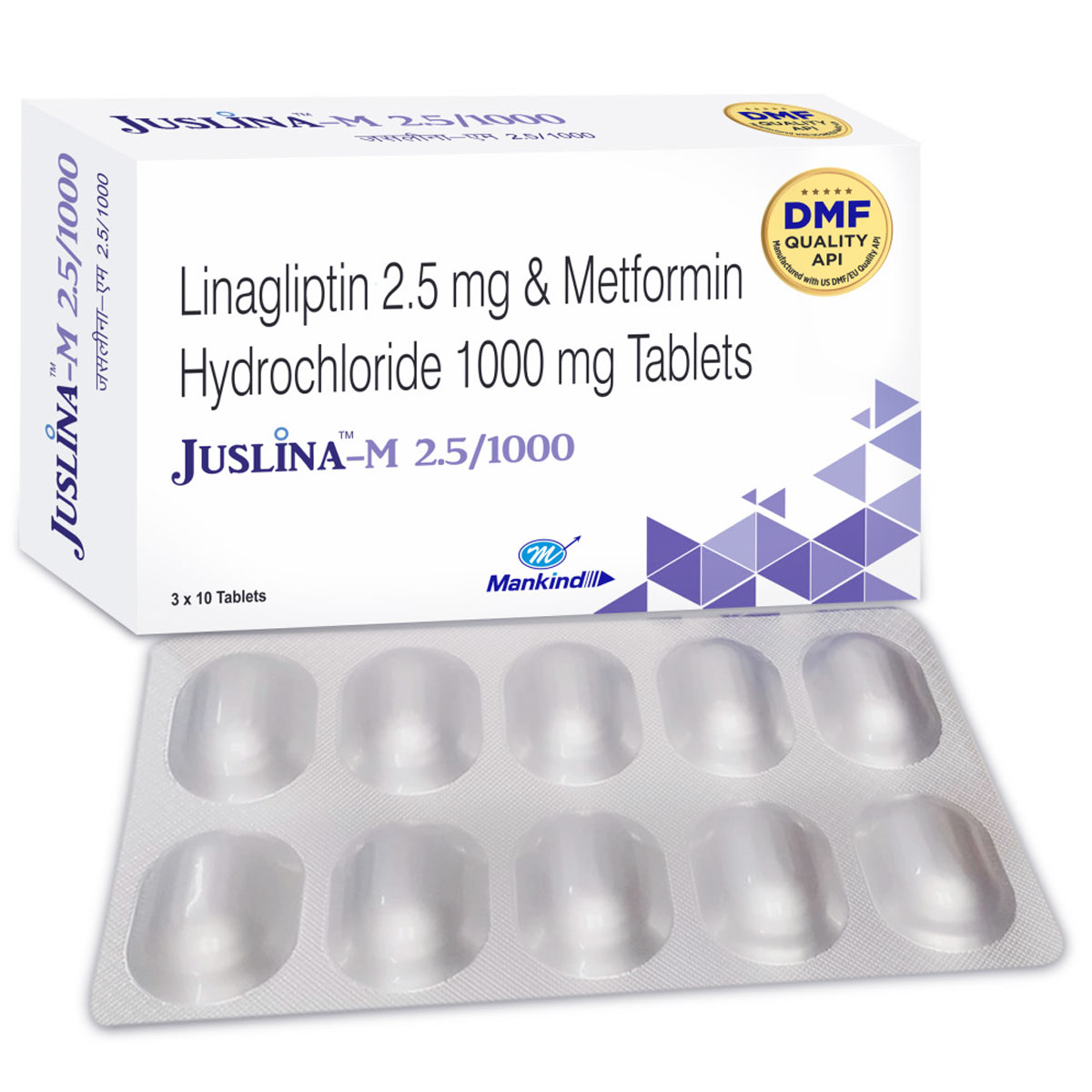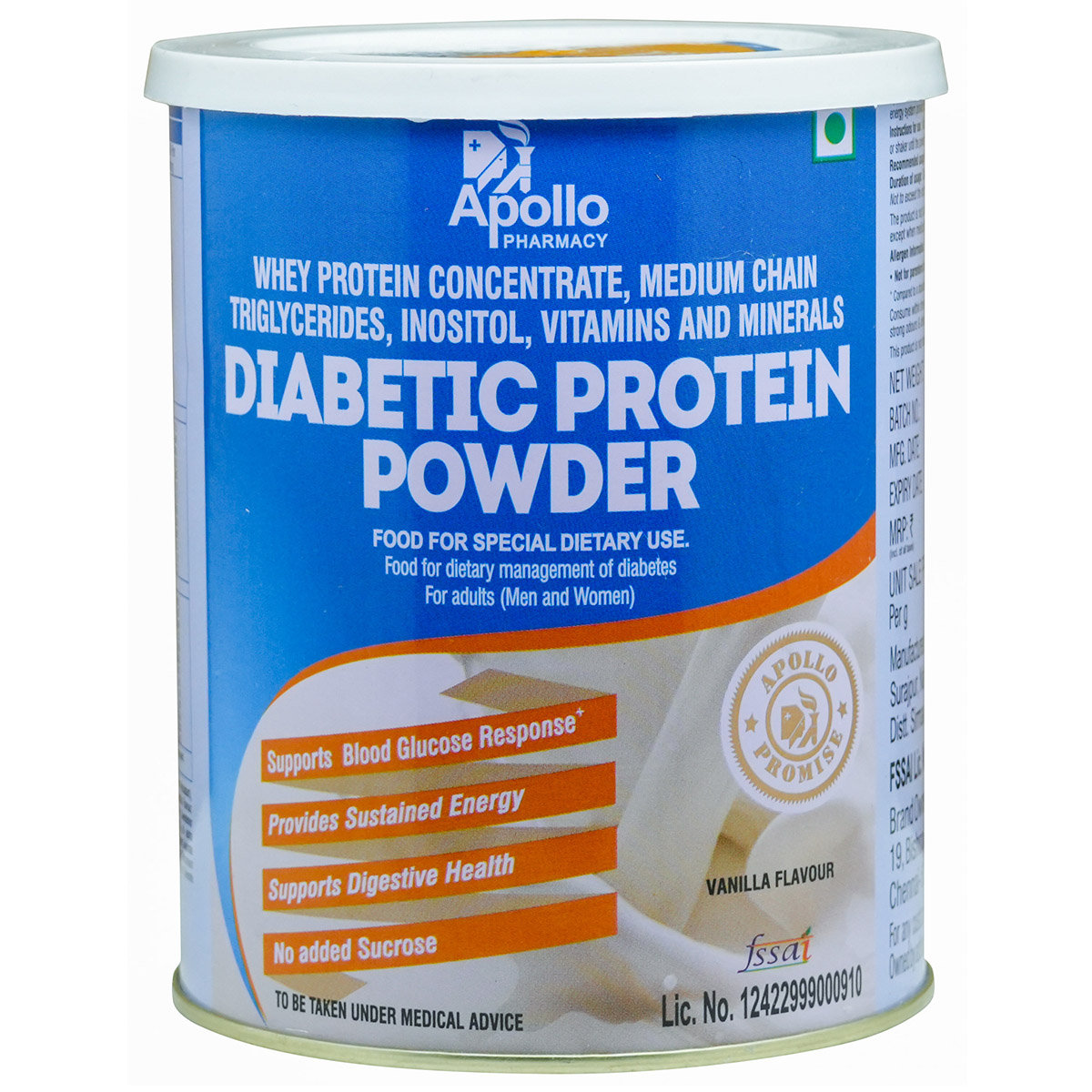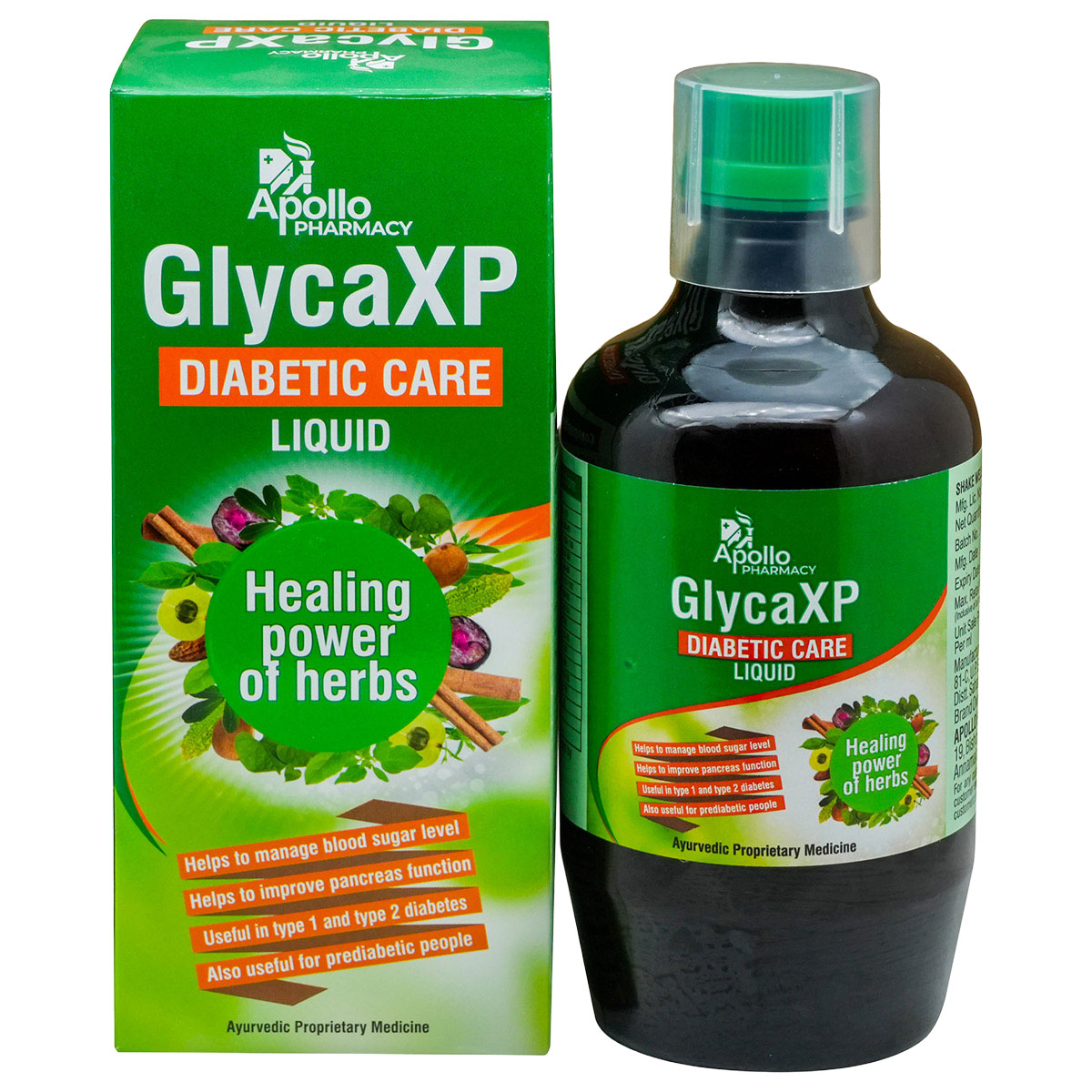Ondero Met 2.5 mg/1000 mg Tablet 10's
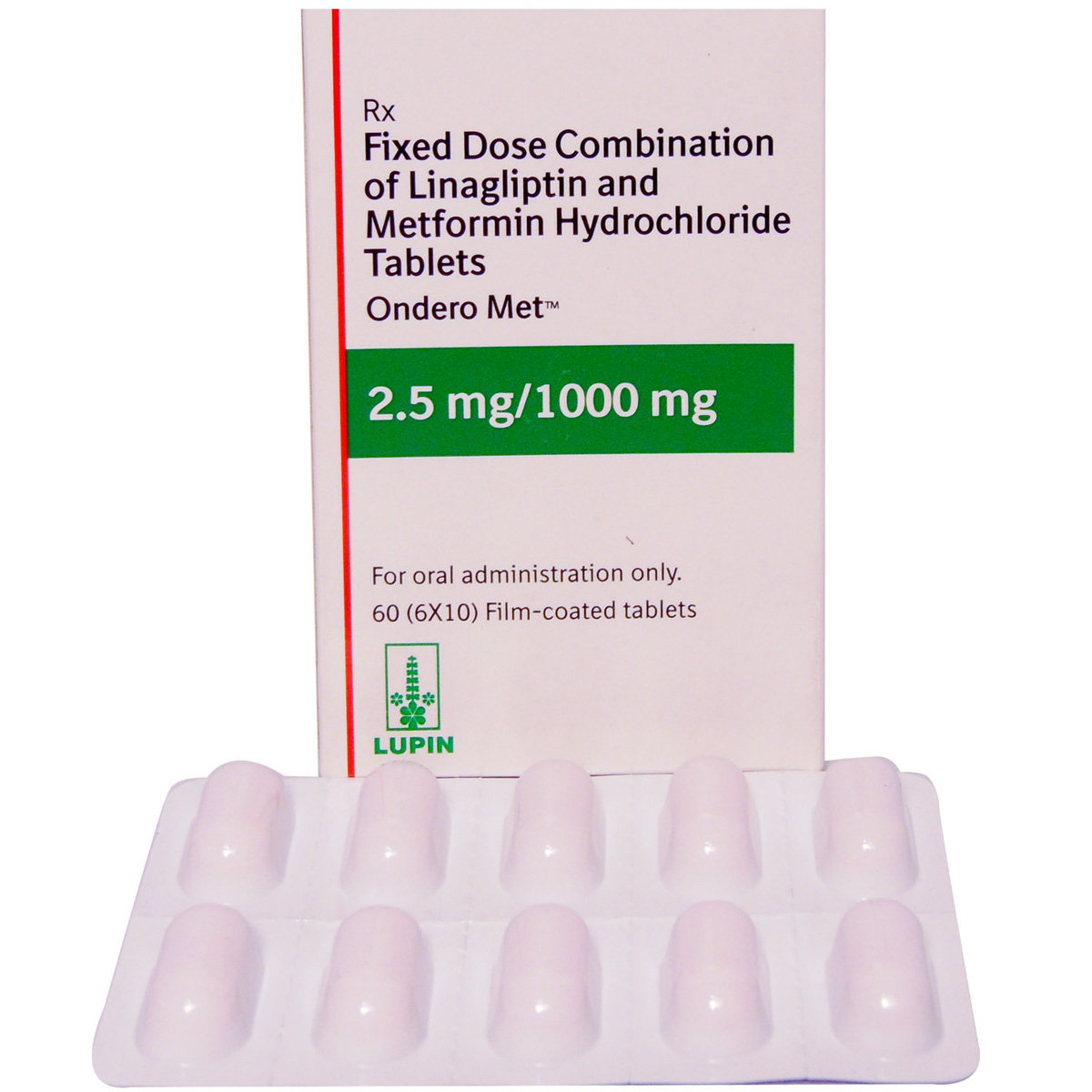
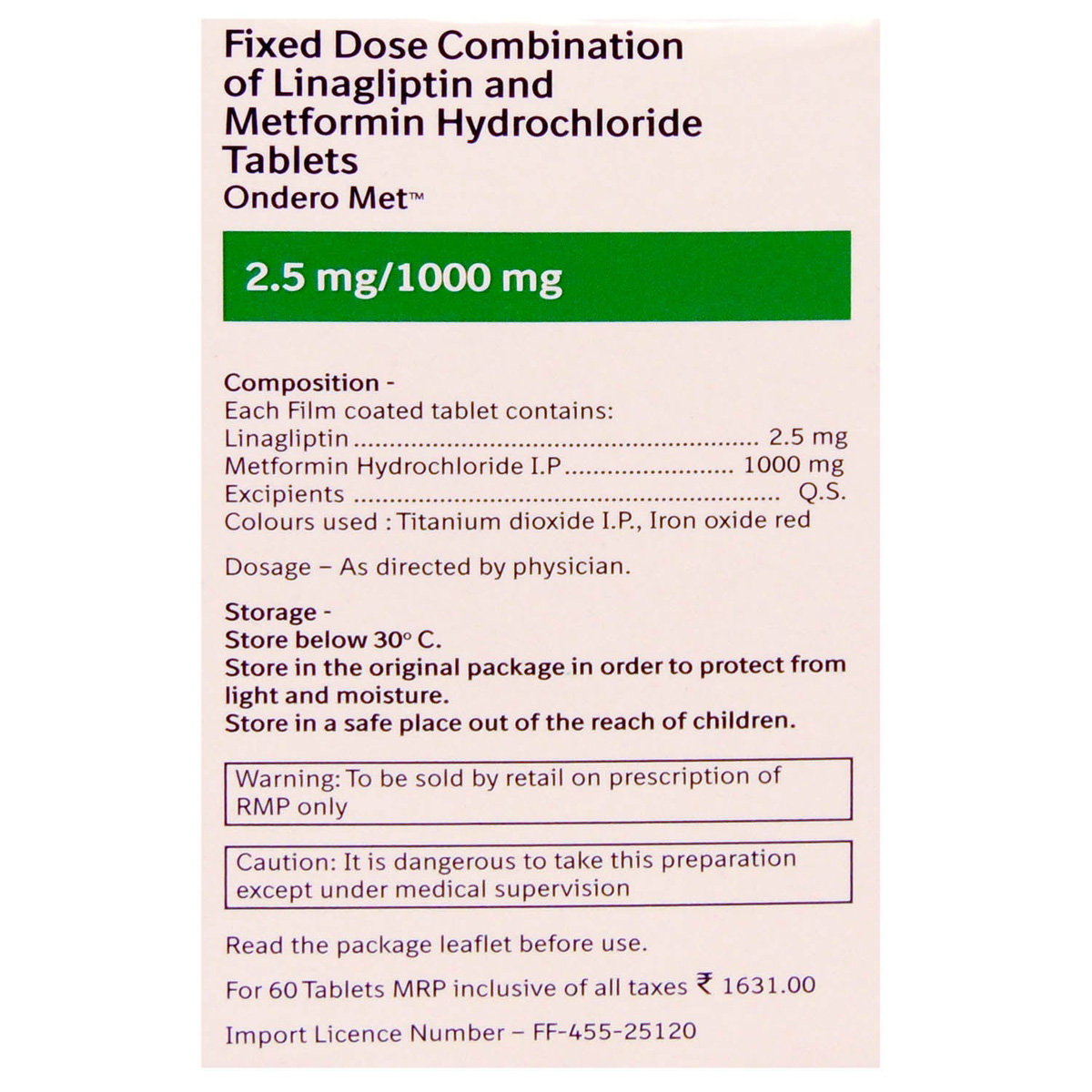
MRP ₹168.5
(Inclusive of all Taxes)
₹20.2 Cashback (12%)
Ondero Met 2.5 mg/1000 mg Tablet is used to treat Type 2 Diabetes. It contains Linagliptin and Metformin, which help the body produce more insulin only when required. It also reduces the amount of sugar produced by the liver when not needed. Also, it lowers glucose production in the liver, delays glucose absorption from the intestines and increases the body's sensitivity to insulin. Thus, it prevents blood glucose levels from rising to very high levels after meals. It may cause common side effects such as hypoglycemia (low blood glucose levels) characterised by dizziness, sweating, palpitations, hunger pangs, dry mouth, skin, etc. So to avoid hypoglycemia, you should not miss meals and should carry some form of sugar along with you. Other side effects include taste change, nausea, diarrhoea, stomach pain, headache, and upper respiratory symptoms.
Know Your Delivery Time
Provide Delivery Location

Secure Payment

India's Most Trusted Pharmacy

Genuine Products
Composition :
Manufacturer/Marketer :
Consume Type :
Return Policy :
Expires on or after :
About Ondero Met 2.5 mg/1000 mg Tablet
Ondero Met 2.5 mg/1000 mg Tablet is a combination drug used in the treatment of type 2 diabetes mellitus. Type 2 diabetes develops when the body does not produce enough insulin or when the body's insulin does not work as well as it should. It can also develop if the body produces too much glucagon. Insulin is a substance which helps to lower the level of sugar in your blood, especially after meals.
Ondero Met 2.5 mg/1000 mg Tablet contains metformin and vildagliptin, which help control blood sugar levels. It works by causing the pancreas to produce more insulin and less glucagon (the effect of vildagliptin) and also by helping the body utilise insulin more effectively (the effect of metformin).
Not everyone who is taking Ondero Met 2.5 mg/1000 mg Tablet will get these side effects. The most common side effect of Ondero Met 2.5 mg/1000 mg Tablet is hypoglycemia (low blood glucose levels) characterised by dizziness, sweating, hunger pangs, dry mouth and skin, etc. Other side effects include changes in taste, nausea, diarrhoea, stomach pain, headache, and upper respiratory symptoms.
Ondero Met 2.5 mg/1000 mg Tablet should be taken with food to avoid an upset stomach. It is advised to take it at the same time each day for best results. For better advice, your doctor will determine the appropriate dose, which can change quickly depending on your condition. Do not skip your meals, and also carry a form of sugar with you to prevent low blood sugar levels.
Avoid taking Ondero Met 2.5 mg/1000 mg Tablet if you are allergic to it. Ondero Met 2.5 mg/1000 mg Tablet should not be stopped even if you feel better without consulting your doctor, as sugar levels may change. If you stop taking Ondero Met 2.5 mg/1000 mg Tablet abruptly, it may increase your sugar levels, which could further increase the risk of eyesight loss (retinopathy), kidney damage and nerve damage. Please inform your doctor if you have any heart disease or are planning to get pregnant or breastfeed. You must continue following the diet and exercise recommended for you while on treatment with Ondero Met 2.5 mg/1000 mg Tablet .
Uses of Ondero Met 2.5 mg/1000 mg Tablet
Ondero Met 2.5 mg/1000 mg Tablet is used in the treatment of Type 2 Diabetes Mellitus. The detailed uses of Ondero Met 2.5 mg/1000 mg Tablet are as follows:
- Management of Diabetes: Ondero Met 2.5 mg/1000 mg Tablet is commonly prescribed to help regulate blood sugar levels in patients with type 2 diabetes, particularly those who may require additional medication alongside lifestyle changes.
- Improvement of Glycemic Control: Ondero Met 2.5 mg/1000 mg Tablet aids in improving overall glycemic control by enhancing insulin sensitivity and decreasing hepatic glucose production.
- Weight Management: In some cases, Ondero Met 2.5 mg/1000 mg Tablet can assist in weight management for diabetic patients, as it may help reduce appetite or modify fat metabolism.
- Prevention of Diabetes Complications: Regular use of Ondero Met 2.5 mg/1000 mg Tablet can contribute to the prevention of long-term complications associated with diabetes, such as neuropathy, nephropathy, and retinopathy.

Have a query?
Directions for Use
- Take Ondero Met 2.5 mg/1000 mg Tablet with or without food as advised by your doctor.
- It is advised to take Ondero Met 2.5 mg/1000 mg Tablet twice daily; however, follow your doctor’s recommendation regarding the dosage and duration.
- Swallow Ondero Met 2.5 mg/1000 mg Tablet as a whole with a glass of water.
- Do not crush, chew, or break it.
Medicinal Benefits
- Ondero Met 2.5 mg/1000 mg Tablet helps your pancreas produce more insulin, effectively utilise insulin, and decrease the excess sugar that your liver makes.
- It helps control the rise of blood sugar levels in your body after a meal.
- Ondero Met 2.5 mg/1000 mg Tablet plays a vital role in controlling blood sugar levels and prevents serious complications of diabetes like eyesight loss (retinopathy), kidney (nephropathy), nerve damage (neuropathy), diabetic foot ulcer and delayed wound healing.
How Ondero Met 2.5 mg/1000 mg Tablet Works
Storage
- Exercise for at least 30 minutes most days of the week.
- Limit alcohol consumption.
- Consider a low carbohydrate diet that limits grains, starchy vegetables and fruit. Include foods rich in protein and fat.
- Avoid excess sugar, fatty foods and carbohydrates.
- Aim for weight loss as it helps to improve cardiovascular health and minimize the risk of complications related to obesity.
- Limit intake of full-fat dairy products, red meat and processed foods rich in saturated fats.
- Avoid foods with label “partially hydrogenated oils”.
- Eat more vegetables, fruits, oats, whole grains, lentils and beans to increase fiber intake.
- Include foods rich in monounsaturated fats like nuts, avocados, olive oil, and oily fish.
- Limit consumption of egg yolks.
- Exercise for at least 30 minutes 5 days a week.
- Aim for weight loss and maintain healthy weight.
- Quit smoking as smoking raises the risk of heart disease associated with cholesterol.
- Limit alcohol consumption as excessive drinking may raise cholesterol levels.
- Eat fiber-rich foods, fruits, and vegetables, and track your food intake to monitor calorie consumption.
- Limit takeout and restaurant meals, and weigh yourself weekly to stay motivated.
- Build balanced meals, allow yourself to enjoy treats in moderation, and prioritize sleep and stress management through exercise and relaxation techniques.
- Consume more protein-rich foods and healthy fats like beans, avocados, cheese, nuts and lean meats to minimize appetite.
- Prefer foods high in fiber to help feel full for a long time.
- If you have decreased appetite, eat only when you are hungry.
- Eat several small meals or snacks all day.
- Try to take only small sips of fluids while eating.
- Inform Your Doctor: Notify your doctor immediately about your diarrhoea symptoms. This allows them to adjust your medication or provide guidance on managing side effects.
- Stay Hydrated: Drink plenty of fluids to replace lost water and electrolytes. Choose water, clear broth, and electrolyte-rich drinks. Avoid carbonated or caffeinated beverages to effectively rehydrate your body.
- Follow a Bland Diet: Eat easy-to-digest foods to help firm up your stool and settle your stomach. Try incorporating bananas, rice, applesauce, toast, plain crackers, and boiled vegetables into your diet.
- Avoid Trigger Foods: Steer clear of foods that can worsen diarrhoea, such as spicy, fatty, or greasy foods, high-fibre foods, and dairy products (especially if you're lactose intolerant).
- Practice Good Hygiene: Maintain good hygiene to prevent the spread of infection. To stay healthy, wash your hands frequently, clean and disinfect surfaces regularly, and avoid exchanging personal belongings with others.
- Take Anti-Diarrheal Medications: If your doctor advises, anti-diarrheal medications such as loperamide might help manage diarrhoea symptoms. Always follow your doctor's directions.
- Keep track of your diarrhoea symptoms. If they don't get better or worse or are accompanied by severe stomach pain, blood, or dehydration signs (like extreme thirst or dark urine), seek medical help.
- Inform your doctor about the nausea and discuss possible alternatives to the medication or adjustments to the dosage.
- Divide your daily food intake into smaller, more frequent meals to reduce nausea.
- Opt for bland, easily digestible foods like crackers, toast, plain rice, bananas, and applesauce.
- Avoid certain foods that can trigger nausea, such as fatty, greasy, spicy, and smelly foods.
- Drink plenty of fluids, such as water, clear broth, or electrolyte-rich beverages like coconut water or sports drinks.
- Use ginger (tea, ale, or candies) to help relieve nausea.
- Get adequate rest and also avoid strenuous activities that can worsen nausea.
- Talk to your doctor about taking anti-nausea medication if your nausea is severe.
- Record when your nausea occurs, what triggers it, and what provides relief to help you identify patterns and manage your symptoms more effectively.
- Preventing Vomiting (Before it Happens)
- Take medication exactly as prescribed by your doctor. This can help minimize side effects, including vomiting.
- Having a small meal before taking your medication can help reduce nausea and vomiting.
- Talk to your doctor about taking anti-nausea medication along with your prescribed medication.
- Managing Vomiting (If it Happens)
- Try taking ginger in the form of tea, ale, or candy to help alleviate nausea and vomiting.
- What to Do if Vomiting Persists
- Consult your doctor if vomiting continues or worsens, consult the doctor for guidance on adjusting your medication or additional treatment.
What if I have taken an overdose of Ondero Met 2.5 mg/1000 mg Tablet
Drug Warnings
- Inform your doctor if you are allergic to Ondero Met 2.5 mg/1000 mg Tablet .
- This medicine should not be used in patients with type 1 diabetes or with diabetic ketoacidosis.
- Some diabetic patients, while taking Ondero Met 2.5 mg/1000 mg Tablet , might develop a rare but serious condition called lactic acidosis (too much lactic acid accumulated in the blood) that can damage the working of your liver and kidneys, which are required for the elimination of excess lactic acid from the blood.
- Before you start taking Ondero Met 2.5 mg/1000 mg Tablet , tell your doctor if you’ve ever had pancreatitis (inflammation of the pancreas), kidney disease, or a low vitamin B12 level.
- Ondero Met 2.5 mg/1000 mg Tablet , when used with insulin, may significantly lower the blood sugar level, leading to a hypoglycemic condition, which can be fatal.
- Inform your doctor if you are pregnant, planning for a pregnancy or breastfeeding before starting the treatment.
- Prolonged intake of Ondero Met 2.5 mg/1000 mg Tablet may lower your thyroid-stimulating hormone (TSH); hence, an annual checkup of TSH is recommended.
- In rare cases, you may also develop a severe skin reaction known as bullous pemphigoid that requires immediate medical attention.
- Inform your doctor if you are scheduled to undergo a diagnostic test that involves an injection of dye or an X-ray contrast agent. The use of Ondero Met 2.5 mg/1000 mg Tablet should be stopped for a short time before having an X-ray procedure.
- It is always important to check for the expiry of the medicine. Discard the medicine if it reaches the expiry date.
Drug-Drug Interactions
Drug-Drug Interactions
Login/Sign Up
Co-administration of Iodixanol with Ondero Met 2.5 mg/1000 mg Tablet can increase the risk of side effects.
How to manage the interaction:
Taking Ondero Met 2.5 mg/1000 mg Tablet with Iodixanol is not recommended, please consult a doctor before taking it. Do not discontinue the medications without consulting a doctor.
Co-administration of Iopamidol with Ondero Met 2.5 mg/1000 mg Tablet can increase the risk of side effects.
How to manage the interaction:
Taking Ondero Met 2.5 mg/1000 mg Tablet with Iopamidol is not recommended, please consult a doctor before taking it. Do not discontinue the medications without consulting a doctor.
Co-administration of Ondero Met 2.5 mg/1000 mg Tablet and Iobitridol can increase the risk of lactic acidosis (when the body produces too much lactic acid).
How to manage the interaction:
Taking Ondero Met 2.5 mg/1000 mg Tablet with Iobitridol is generally avoided as it can result in an interaction. Please consult your doctor before taking it.
Co-administration of Ondero Met 2.5 mg/1000 mg Tablet and Iocetamic acid can increase the risk of lactic acidosis (when the body produces too much lactic acid).
How to manage the interaction:
Taking Ondero Met 2.5 mg/1000 mg Tablet with Iocetamic acid is generally avoided as it can result in an interaction, please consult your doctor before taking it.
Co-administration of Iotroxic acid with Ondero Met 2.5 mg/1000 mg Tablet can increase the risk of side effects.
How to manage the interaction:
Taking Ondero Met 2.5 mg/1000 mg Tablet with Iotroxic acid is not recommended, please consult your doctor before taking it.
Co-administration of Iofendylate with Ondero Met 2.5 mg/1000 mg Tablet can increase the risk of side effects.
How to manage the interaction:
Taking Ondero Met 2.5 mg/1000 mg Tablet with Iofendylate is generally avoided as it can result in an interaction, please consult your doctor before taking it.
Co-administration of Ondero Met 2.5 mg/1000 mg Tablet and Iobenzamic acid can increase the risk of lactic acidosis (when the body produces too much lactic acid).
How to manage the interaction:
Taking Ondero Met 2.5 mg/1000 mg Tablet with Iobenzamic acid is generally avoided as it can result in an interaction, please consult your doctor before taking it.
Co-administration of Iopromide with Ondero Met 2.5 mg/1000 mg Tablet can increase the risk of lactic acidosis.
How to manage the interaction:
Taking Iopromide with Ondero Met 2.5 mg/1000 mg Tablet is not recommended, please consult a doctor before taking it. Do not discontinue the medication without consulting a doctor.
Co-administration of Ioversol with Ondero Met 2.5 mg/1000 mg Tablet can increase the risk of side effects.
How to manage the interaction:
Taking Ondero Met 2.5 mg/1000 mg Tablet with Ioversol is not recommended, please consult your doctor before taking it.
Co-administration of Iomeprol with Ondero Met 2.5 mg/1000 mg Tablet can increase the risk of side effects.
How to manage the interaction:
Taking Ondero Met 2.5 mg/1000 mg Tablet with Iomeprol is not recommended, please consult a doctor before taking it. Do not discontinue the medications without consulting a doctor.
Drug-Food Interactions
Drug-Food Interactions
Login/Sign Up
Diet & Lifestyle Advise
- Fill your half plate with starchy veggies, a quarter with proteins, and a quarter with whole grain.
- Eat at regular intervals. Do not take a long gap between a meal or snack.
- Monitor your blood sugar level regularly, especially when there are lots of fluctuations.
- Invest at least 150 minutes of moderate-intensity physical activity or one hour and 15 minutes of high-intensity exercise weekly.
- Lose weight gradually to achieve a healthy body mass index (18.5 to 24.9).
- Replace refined carbohydrates containing whole-grain foods and increase the intake of fruits, veggies, and other fibre-enriched foods.
- Reduce saturated fat (or hidden fats) intake in food like chips, crisps, pastries, biscuits, and samosas. Choose omega-3 fatty acid-containing oils for daily cooking. For frying, you can use palm oil, mustard oil, groundnut oil, rice bran oil, and safflower oil.
- Do not take stress as it may elevate your blood sugar level. You can adopt stress management techniques like mindfulness to control stress-related blood sugar changes.
- Opt for low-fat dairy products (low-fat yoghurt, fat-free milk, cheese, etc.).
- Keep your blood pressure as normal (140/90) as possible as it reduces the risk of cardiovascular diseases in diabetes patients.
Habit Forming
Therapeutic Class
All Substitutes & Brand Comparisons
RX
Juslina-M 2.5/1000 Tablet 10's
Mankind Pharma Pvt Ltd
₹81.5
(₹7.34 per unit)
50% CHEAPERRX
Dynaglipt-LM 2.5/1000 Tablet 10's
Mankind Pharma Pvt Ltd
₹82
(₹7.38 per unit)
50% CHEAPERRX
Linero M 1000 Tablet 10's
Intas Pharmaceuticals Ltd
₹92.5
(₹8.33 per unit)
43% CHEAPER
Alcohol
Unsafe
It is best to avoid alcohol while taking Ondero Met 2.5 mg/1000 mg Tablet .
Pregnancy
Consult your doctor
Please consult your doctor for advice before using Ondero Met 2.5 mg/1000 mg Tablet .
Breast Feeding
Consult your doctor
Please consult your doctor for advice before using Ondero Met 2.5 mg/1000 mg Tablet .
Driving
Caution
Drive only if you are physically stable and mentally focussed; if you experience drowsiness after taking these medications, you should not drive or operate any machinery or vehicles.
Liver
Consult your doctor
If u have or had a history of any liver-related diseases, please consult the doctor before taking medicine.
Kidney
Caution
If u have or had a history or evidence of any kidney-related diseases, please consult the doctor before taking medicine.
Children
Caution
It is advisable to consult a doctor before using it.
Heart
Ondero Met 2.5 mg/1000 mg Tablet should be used with caution if you have any cardiac problems. This medicine is contraindicated in patients with severe heart failure.
Geriatrics
Caution
Caution should be exercised in geriatric patients while taking Ondero Met 2.5 mg/1000 mg Tablet .
FAQs
Ondero Met 2.5 mg/1000 mg Tablet is used in the treatment of Type 2 Diabetes Mellitus.
Type 2 diabetes is a common form of diabetes in which the blood sugar-lowering hormone called insulin, produced by the body, does not function properly. Thus, the blood glucose level increases, and symptoms such as frequent urination, increased thirst, and increased hunger start. Diabetes, if left untreated or not treated properly, can cause long-term complications such as nerve damage, kidney damage, eye damage, foot problems, and poses a high risk of developing heart diseases.
Lactic acidosis is a rare but life-threatening condition when there is too much lactic acid built up in the bloodstream. Long term intake of Ondero Met 2.5 mg/1000 mg Tablet may lead to lactic acidosis when cells get deprived of oxygen levels. Lactic acidosis symptoms include a burning sensation of muscle, muscle ache, fast breathing, nausea, and stomach pain. Immediately contact the doctor about this complication.
Do not take excessive alcohol while taking Ondero Met 2.5 mg/1000 mg Tablet , as this may increase the risk of a life-threatening condition called lactic acidosis (too much lactic acid in the body).
No, Ondero Met 2.5 mg/1000 mg Tablet is only prescribed to treat type 2 diabetes, also called 'non-insulin-dependent diabetes.
Ondero Met 2.5 mg/1000 mg Tablet should be given with caution in older adults as they are at an increased risk of hypoglycemia. Consult your doctor; dose adjustment may be required, and take Ondero Met 2.5 mg/1000 mg Tablet in dose as prescribed by your doctor.
If you feel that your blood sugar level is decreasing and you are feeling weak, immediately eat sugar candies or drink sugary beverages. It will help to balance the blood sugar level in your body. So, it is advisable to keep sugar candies with you.
Ondero Met 2.5 mg/1000 mg Tablet contains Linagliptin (DPP4 inhibitors) and Metformin (Biguanide). Linagliptin is a dipeptidyl peptidase-4 (DPP-4) inhibitor that blocks the action of DPP-4, an enzyme that destroys the hormone incretin that helps the body produce more insulin only when required. It also reduces the amount of sugar produced by the liver when not needed. Metformin functions by lowering glucose production in the liver, delaying glucose absorption from the intestines and increasing the body's sensitivity to insulin. Together, it prevents blood glucose levels from rising to very high levels after meals.
Ondero Met 2.5 mg/1000 mg Tablet may cause lactic acidosis. Consult the doctor if you experience symptoms of lactic acidosis, such as discomfort, muscle aches, nausea, and stomach pain.
Possible side effects of Ondero Met 2.5 mg/1000 mg Tablet are low blood sugar, taste change, nausea, diarrhoea, stomach pain, headache, and upper respiratory symptoms. Consult the doctor if the side effects persist or worsen.
Ondero Met 2.5 mg/1000 mg Tablet should not be taken if you are allergic to any of its components, have metabolic acidosis, diabetic ketoacidosis, or severe renal impairment.
Intake of excessive alcoholic beverages may increase the chance of a life-threatening condition known as lactic acidosis. So, avoid intake of alcoholic beverages with Ondero Met 2.5 mg/1000 mg Tablet .
Store Ondero Met 2.5 mg/1000 mg Tablet at room temperature, in a dry place. Keep out of sight and reach of children.
Yes, Ondero Met 2.5 mg/1000 mg Tablet may cause hypoglycaemia (low blood sugar) characterised by dizziness, sweating, palpitations, hunger pangs, and dry mouth/skin. Carry sugary food such as candy or juice and consume it if you experience these symptoms.
Yes, Ondero Met 2.5 mg/1000 mg Tablet may lead to vitamin B12 deficiency, particularly on long-term use. Consult the doctor if you experience symptoms of vitamin B12 deficiency, such as headache, loss of appetite, fatigue, mental impairment, numbness or tingling, and pale skin.
Country of origin
Manufacturer/Marketer address
Customers Also Bought
Disclaimer
Author Details
We provide you with authentic, trustworthy and relevant information
Reference
- https://www.mayoclinic.org/drugs-supplements/linagliptin-and-metformin-oral-route/before-using/drg-20075407
- https://www.healthline.com/health/linagliptin-metformin-oral-tablet
- https://www.ncbi.nlm.nih.gov/pmc/articles/PMC4284079/
- https://www.nhs.uk/medicines/metformin/
- https://www.nhs.uk/medicines/linagliptin/
Buy best Diabetics products by
Torrent Pharmaceuticals Ltd
Intas Pharmaceuticals Ltd
Eris Life Sciences Ltd
Lupin Ltd
Micro Labs Ltd
Sun Pharmaceutical Industries Ltd
Mankind Pharma Pvt Ltd
Alkem Laboratories Ltd
Lloyd Healthcare Pvt Ltd
Cipla Ltd
Macleods Pharmaceuticals Ltd
Abbott India Ltd
Primus Remedies Pvt Ltd
Glenmark Pharmaceuticals Ltd
Aristo Pharmaceuticals Pvt Ltd
Dr Reddy's Laboratories Ltd
USV Pvt Ltd
La Renon Healthcare Pvt Ltd
Wockhardt Ltd
Emcure Pharmaceuticals Ltd
Fusion Health Care Pvt Ltd
Ajanta Pharma Ltd
Ipca Laboratories Ltd
Alembic Pharmaceuticals Ltd
Corona Remedies Pvt Ltd
East West Pharma India Pvt Ltd
Hbc Life Sciences Pvt Ltd
Eswar Therapeutics Pvt Ltd
Zydus Healthcare Ltd
Alteus Biogenics Pvt Ltd
Elbrit Life Sciences Pvt Ltd
Mitoch Pharma Pvt Ltd
Medley Pharmaceuticals Ltd
Ranmarc Labs
Sinsan Pharmaceuticals Pvt Ltd
Msn Laboratories Pvt Ltd
Nirvana India Pvt Ltd
Tas Med India Pvt Ltd
Akumentis Healthcare Ltd
Arkas Pharma Pvt Ltd
Leeford Healthcare Ltd
Novo Nordisk India Pvt Ltd
Unison Pharmaceuticals Pvt Ltd
Sanofi India Ltd
Acmedix Pharma Llp
Q Check Pharmaceuticals
Blue Cross Laboratories Pvt Ltd
Xemex Life Sciences
Neucure Lifesciences Pvt Ltd
Alvio Pharmaceuticals Pvt Ltd
Anthem Bio Pharma
Spectra Therapeutics Pvt Ltd
Sydmen Life Sciences Pvt Ltd
Aareen Healthcare Pvt Ltd
Diacardus Pharmacy Pvt Ltd
Jubilant Lifesciences Ltd
Systopic Laboratories Pvt Ltd
Talent India Pvt Ltd
Edoc Life Sciences Pvt Ltd
Stature Life Sciences Pvt Ltd
Franco Indian Pharmaceuticals Pvt Ltd
Panacea Biotec Ltd
Sanz Pharmaceuticals
Shrrishti Health Care Products Pvt Ltd
Verse Lifesciences
Akesiss Pharma Pvt Ltd
Hicxica Formulations Pvt Ltd
Indoco Remedies Ltd
Lividus Pharmaceuticals Pvt Ltd
Capital Pharma
Elinor Pharmaceuticals (P) Ltd
Saan Labs
Zydus Cadila
Biocon Ltd
Eli Lilly and Company (India) Pvt Ltd
Lippon Pharma Pvt Ltd
MERAKI HEALTH
Remedy Life Sciences Pvt Ltd
Koye Pharmaceuticals Pvt Ltd
Morepen Laboratories Ltd
Atos Lifesciences Pvt Ltd
Eysys Pharmaceutical Pvt Ltd
MEDICAMEN BIOTECH LTD
Azkka Pharmaceuticals Pvt Ltd
Converge Biotech Pvt Ltd
Erinyle Health Care Pvt Ltd
Elder Pharmaceuticals Ltd
FDC Ltd
Heal (India) Laboratories Pvt Ltd
Knoll Healthcare Pvt Ltd
Jarun Pharmaceuticals Pvt Ltd
Opsis Care Lifesciences Pvt Ltd
Vasu Organics Pvt Ltd
Wallace Pharmaceuticals Pvt Ltd
CADOMAX HEALTHCARE PVT. LTD
Cadomed Pharmaceuticals India Pvt Ltd
Daylon healthcare pvt Ltd
Lincoln Pharmaceuticals Ltd
Medicure Life Sciences Pvt Ltd
Olcare Laboratories Pvt Ltd
Recommended for a 30-day course: 3 Strips


